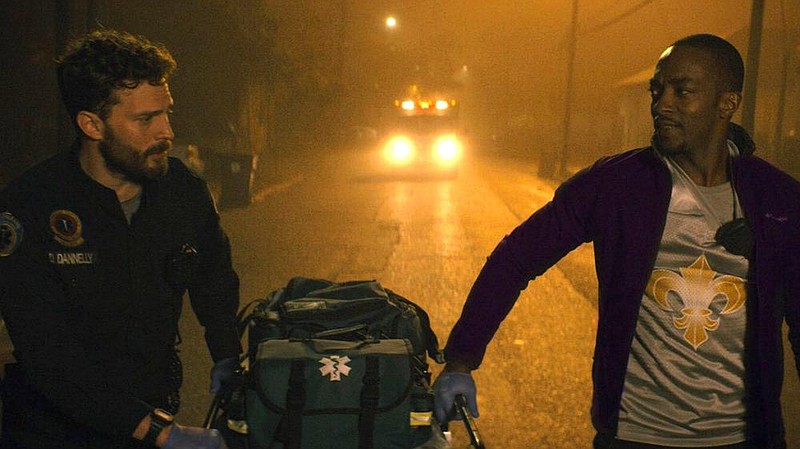We can more or less divvy up time travel flicks into two distinct categories: Unrealistic, but fun ("Back to the Future," "Avengers: Endgame") or, in adhering more to the dense laws of physics, pretty impenetrable ("Primer," "2001"). This dichotomy also forces us to choose between lighter entertainment and dire dissertation with very little in-between. Bridging the gap between the two is difficult for all the obvious narrative reasons, which is where Justin Benson and Aaron Moorhead have arrived with their time-travel drama "Synchronic," one boot in each camp, but neither with very secure footing.
Benson and Moorhead have already defied the odds once: Their previous picture, "The Endless," from 2017, posited the creepy mystery of a UFO cult with a couple of ex-followers as a kind of sci-fi thriller that managed to be engrossing and clever, confounding audience skepticism. It was exciting to see them buck expectations and portended to good things for the young tag-team directors.
This film isn't quite as successful, alas, but not from lack of trying. Anthony Mackie plays Steve, a New Orleans-based EMT, working alongside his childhood best friend, Dennis (Jamie Dornan), as they take care of the wounded, infirm, and overdosed in the city's more hard-hit districts. An eternal playboy, with a loving dog, and an address book brimming with available and willing sexual partners, Steve stands in stark contrast to his friend, married nearly two decades to a wife, Tara (Katie Aselton), who has turned away from him, and an 18-year-old daughter, Brianna (Ally Ioannides), who stays out for nights at a time with her crew of drug-loving friends.
When they see a small upsurge in ODs, particularly ones that have ended in peculiarly violent trauma (one such victim is stabbed through his body with what is assumed to be a sword; another suffers from the potent venom of a snake long since departed from the geographic area), Steve becomes more and more concerned, eventually linking these new cases with the empty black-foil wrappers of a drug, Synchronic, he has never heard of before.
At the same time, his life of booze and frivolity comes to a crashing halt when he's diagnosed with an aggressive form of brain cancer, giving him a likelihood of a painfully protracted death in the near future. Eventually, with the helpful explanation of rogue chemist Dr. Kermani (Ramiz Monsef), who created the synthetic Synchronic as an alternative to MDMA, Steve learns that the drug affects the Pineal gland, somehow allowing users to experience time non-linearly, "as it actually is," (here, the chemist offers a welcome and accessible metaphor: Picking up one of Steve's LPs, he explains that time, like the grooves on the record, is always there, and the needle on the turntable arm is, then, the drug itself, going on to evoke Einstein's famous quote about the difference between past, present and future being nothing more than a "stubbornly persistent illusion").
Dennis and Tara, meanwhile, discover that Brianna has disappeared, after a night of drugging it up at a friend's apartment. They grow more and more frantic in their search, which drives them farther apart. Having gleaned the intel about the time-travel drug, and the chemist's belief that younger people, with their less calcified brains, can get stuck in their new time period after dosing, Steve makes the decision to take the drug himself as a way of somehow finding her and bringing her back to the present day. Armed with the last collection of pills in existence, according, again, to Dr. Kermani, he begins systematically experimenting with the drug to figure out how it works (for one thing, the time period you're sent to turns out to be determined by where you are exactly standing at the time of your dosage; for another, older people can stay in the past for exactly seven minutes), in order to form a rescue plan.
The film works best when it stays grounded in the characters' lives, as thinly sketched as they may be, and somewhat less well in its third act, where the implausibilities start piling up, and the sketchy rules of the time-travel drug offer solutions that seem all too convenient for the protagonists. It's also a bit unclear what Benson's screenplay is after, exactly. Set in a post-Katrina New Orleans, with Steve haunted by the image of his family's coffins rising up in the floodwaters and pilfered by looters, it feels at times like a lament for an earlier era; other times, a kind of live-in-the-moment tract ("The present is a miracle, bruh!"), and/or a warning not to waste the time you do have left.
Steve and Dennis bicker and squabble, laugh and tell old stories about themselves, and spend idle nights boozing out together or hitting golf balls from a deserted parking lot into the Louisiana night. It is their devotion to each other that is meant to power the film's emotional core, but so little is known about Dennis, other than his unhappiness with his married life, that it feels like half of an empty equation. Near the end, the two friends shake hands resolutely, holding together, even as it seems it can't last: One of them is meant to be ghostly, but it's the one still rooted in the here and now that seems the most indistinct.
More News
‘Synchronic’
83 Cast: Anthony Mackie, Jamie Dornan, Katie Aselton, Ally Ioannides, Matthew Underwood, Ramiz Monsef, Carl Palmer
Directors: Justin Benson, Aaron Moorhead
Rating: R, for drug content and language throughout, and for some violent/bloody images
Running time: 1 hour, 36 minutes
Playing theatrically

